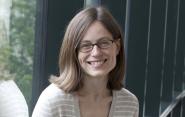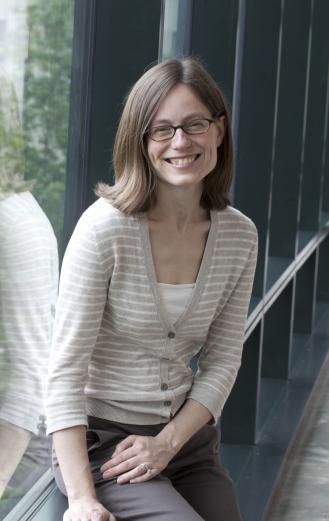Miller-Jensen Wins 2014 Ackerman Award for Teaching and Mentoring

Kathryn Miller-Jensen, assistant professor of biomedical engineering & molecular, cellular, & developmental biology, has been selected to receive the 2014 Ackerman Award for Teaching and Mentoring. Made possible by a generous gift from SEAS alum Robert W. Ackerman ’60, this annual award, which includes a $5,000 cash prize, recognizes outstanding teaching and mentoring as evidenced by the faculty member's impact on, and involvement with, students.
“Since arriving at Yale four years ago, I’ve worked hard to make my teaching better and better, so this award is incredibly gratifying,” said Miller-Jensen. “For the same reason, it also feels like something I need to live up to as I start preparing for next semester.”

Nominators described Miller-Jensen as an experienced, motivated, and encouraging mentor who “trusts students’ abilities,” and her combination of mentoring, teaching, and research was highlighted as a model for students to emulate. Moreover, the student panel who reviewed award nominees praised Miller-Jensen’s ability to tailor her courses to student interests—which Miller-Jensen considers a key component of her classroom success.
“Learning, even in core courses, doesn’t have to be boring,” she said. “So after my first year of teaching, I decided to focus on the things that excite me. For a course like ‘Biomolecular Transport and Kinetics,’ a core junior-level course, I tapped into my research on modeling subcellular reactions, cell signaling and transcription—and I kind of flipped the course over into something new the second time I taught it.”
That “something new” was a tighter integration of biology and engineering, the kind of integration that has fueled Miller-Jensen’s career. Her research into innate immune signaling and HIV latency combines biological measurements with mathematical and computational modeling. “We are both an experimental and a computational lab,” she said, “so we spend a lot of time thinking about how to collect quantitative experimental data and then we also apply modeling techniques to that data.”
Informed by her lab experience, Miller-Jensen saw that same overlap of interests in her students. “Yale students take a lot of cellular and molecular biology courses in addition to their engineering courses,” she said, “so I wanted a class that would help them see how engineering principles connect directly to the basic biological reactions occurring inside cells. What I like to say is the cell is a little machine—it takes in inputs, it has outputs, and there is some function inside that cell that as engineers we believe we can understand. In my classes, I want students to see how even their bio courses are integral to helping them think about how to apply engineering principles to real-world problems.
“And it seems like that effort was appreciated. This award shows me that it made a difference.”

